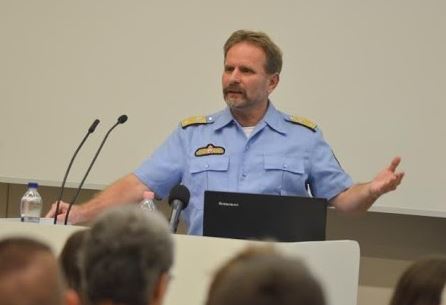Peter Ruzonyi is Doctor of the Hungarian Academy of Sciences and was a part of the EPEA Steering Committee as Regional Representative for many years and head of the former Hungarian EPEA Branch.
About Dr. Rozsonyi, https://doktori.hu/index.php?menuid=192&lang=EN&sz_ID=8101
Ruzsonyi, P. (2018). Criminal Pedagogy and the Reintegration of Prisoners. Budapest: Dialog Campus. 140 p. ISBN: 9786155877025 ISBN: 9786155877032
LINK TO DOCUMENT
Abstract: Criminal pedagogy is a branch of science unknown to – or at least unused by – the Anglo–Saxon countries. One of our most important goals with this monograph is to provide a comprehensive summary of the principal attributes of this field of science for those experts, scientists, teachers and university students who gather their material from English academic literature. We sincerely hope that by providing an introduction to criminal pedagogy, we can provide a novel insight to the reader, contributing to the joint effort of tertiary crime prevention. We hope that by introducing the evolution of criminal pedagogy, we can convey our opinion on the importance of events taking place within prisons and their influence on the post-release life of prisoners. Trying to reduce detrimental effects in prisons is not enough. We have to create a structured whole of programs, treatments, therapies, education and trainings which can be used by the prisoners for their improvement. By presenting a criminal- pedagogical personality-evaluation structure, we want to provide background knowledge of practical usability; determining the elements in one’s personality which could be addressed in order to facilitate further changes.
Ruzsonyi, P. (2018): The Past and Present of the Juvenile Detainees’ Pedagogically Based Treatment in Canada. PEDACTA 7:2 pp. 35-46.
LINK TO DOCUMENT
Abstract: The Canadian correctional system as a whole has a diverse array of measures and practices to address issues on the field, these questions are all valid ones in the case of the Nova Scotia Youth Facility an institution that has been a pioneer in the matter of pedagogically treating juvenile delinquency. Despite several legislative and practical changes during its existence, it managed to maintain (and even improve) its unique way of increasing the chances of juveniles under its jurisdiction for a successful reinsertion into society, all the while honouring certain traditions bestowed upon it by the decades of its existence. With this study, we aim to provide a brief introduction to the operation of the Nova Scotia Youth Facility, the historical and legislative background that serves both as the foundation and – in some cases – the obstruction of its goals and methods. During our investigation, we focus on several crucial aspects which underpin the Nova Scotian practice, such as the status of Youth Workers, the unique Restorative Practice carried out within its walls, the group sessions and the changes in the related regulations.
Keywords: Canada, juveniles, Youth Workers, Restorative Practice, Waterville – Nova Scotia Youth Facility
Ruzsonyi, P. (2018): Similarities between the Hungarian criminal-pedagogical theory and the practice related to the closed-institution treatment of juveniles in Nova Scotia. PEDACTA 8:1 pp. 13-22.
LINK TO DOCUMENT
Abstract: Since the Restorative Practice (and thus, the personality-improvement of the convicts) used by the Nova Scotia facility is in many ways a unique one, we will investigate the methodology behind it from the aspect of criminal-pedagogy. For this effort, we will use evaluation charts in order to 1) discover and show the personality elements requiring professional attention and 2) provide an in-depth examination of certain components within these elements. Hopefully, this method will be suitable for facilitating the comprehension of certain key attributes that are targeted during the treatment of juveniles. The study is aimed at providing an insight into the completely different practices followed by Hungary and Canada in treating juvenile delinquents with the aim of delineating measures and mapping out a trajectory for future professional efforts. As a result of our research, we will also put forth a thesis statement on the successful efforts of the Nova Scotia Youth Facility.
Keywords: Canada, juveniles, Restorative Practice, Waterville – Nova Scotia Youth Facility, Personality-improvement, Criminal-pedagogy
Ruzsonyi, P. (2017): Serial Killers on the Other Side of the Bars: “Bestial Humans – Human Beasts”. ACADEMIC AND APPLIED RESEARCH IN MILITARY AND PUBLIC MANAGEMENT SCIENCE 16 (2017) : 3 pp. 5-34.
LINK TO DOCUMENT
Abstract: Serial killers are present all over the globe. Their acts shock and—not surprisingly—anger the public. This study will—for the first time in Hungary—focus on serial killers convicted in Hungary by analysing their crimes and their behaviour during incarceration. This paper has the as-yet unprecedented aim of providing a general picture about serial killers on the “other side” of the prison bars, and within the prisons themselves. Besides dealing with the life and activities of the serial killers before their incarceration on international level, it will also put forward a comprehensive picture about the origin and meaning of the term “serial killer”, all the while discussing the general attributes of those who belong to this category. The study will also provide an overview about the main ideas on making distinctions and conducting classification into different types and examines the issues that are related to female serial killers. We will also analyse the actions of serial killers incarcerated within Hungarian prisons and evaluate their behaviour within the institution in order to predict their likely conduct using a completely novel risk assessment procedure. Our study also has a second part in which we will address the peculiarities pertaining to the punishment of life without parole, especially as 67% of the currently incarcerated Hungarian serial killers have received this sanction for their deeds.
Keywords: serial killers, serial murderers, bestial humans
Ruzsonyi, P. (2018): Life Sentence Without the Possibility of Parole: We Do not Allow Them to Live, We Do not Let Them Die. ACADEMIC AND APPLIED RESEARCH IN MILITARY AND PUBLIC MANAGEMENT SCIENCE 17 : 2 pp. 111-126.
LINK TO DOCUMENT
Abstract: In the first part of our study (Serial Killers on the Other Side of the Bars: “Bestial Humans—Human Beasts”) we focused on the crimes committed by serial murderers, identified alternatives of classification and analysed their behaviour within the prison walls. In the upcoming part, we will investigate international and domestic experiences related to the use of life without parole; review the way of life of those who have been sentenced to “life until death”; examine the punishment’s mechanics and impact and finally conduct an analysis of the present form of the notion “not allowing them to live, not letting them die”. The basis for this inquiry is the fact that currently, 67% of the serial killers serve a sentence of life without parole. [In Hungary, the practice of sentencing convicts to life without parole is regulated by the Criminal Code. In its principle, this form of punishment means that those who receive this sentence will never be released on parole (42. §).Article 46/A‒B of the Prison Code; however, it also introduces a mandatory clemency procedure for those who are serving a life sentence without parole. This procedure maybe initiated after 40 years served.] Furthermore, we also endeavour to collect the characteristics of this sanction, evaluate related professional opinions and put forth a suggestion for an amendment, as well.
Keywords: serial killers, life without parole, international practices, time as a dimension, criminal-pedagogy
Ruzsonyi, P. (2020) Crisis-management and Criminal-pedagogy in Prisons. In: Jačimovski, S (ed.) Archibald Reiss Days 2020: thematic conference proceedings of international significance: Beograd, 18-19 November 2020. Beograd, Serbia: University of Criminal Investigation and Police Studies pp. 119-130.
LINK TO DOCUMENT
Abstract: The criminal justice process includes: finding out information about the committing criminal offense; investigation; arrest of the suspect; imposition of a sentence; in many cases the enforcement of imprisonment and finally the reintegration of the ex-prisoner. The citizens’ sense of security depends on the completeness of this process. Nonetheless, during the analysis of the “contemporary security challenges” the law enforcement profession deals undeservedly little with imprisonment and the reintegration of detainees. This is a huge mistake, because prison systems are in a global crisis and their effectiveness is highly questionable. The paper strives to describe and analyse the typical causes of the crisis as well as to propose measures to improve the situation: the development of physical conditions is certainly important, but the pedagogical training of the staff and the organization and conduct of the daily life of prisoners – according to unified penological principles (criminal-pedagogy) – must be the focus of the activity.
Keywords: prison-crisis, officers’ training, criminal-pedagogy, reintegration, organizing principle
Ruzsonyi P. (2019): Is “Life without Parole” Sentence a Dead End or a Reasonable Self Defence Reaction? In: STEVO, JAĆIMOVSKI (ed.) ARCHIBALD REISS DAYS 2019. Beograd, Serbia : University of Criminal Investigation and Police Studies (2019) pp. 3-16.
LINK TO DOCUMENT
Abstract: This study focuses on a very special prison sentence: “life without parole”. We investigate the international and Hungarian experience related to the use of life without parole; review the way of life of those who have been sentenced to it; examine the punishment’s mechanism and impact and finally conduct an analysis of the present form of the notion “not allowing them to live, not letting them die”. In Hungary, the practice of sentencing convicts to life without parole is regulated by the Criminal Code. In its principle, this form of punishment means that those who receive this sentence will never be released on parole. The Prison Code, however, also introduces a mandatory amnesty procedure for those who are serving a life sentence without parole. Furthermore, we also endeavor to collect the characteristics of this sanction, evaluate related professional opinions and initiate a suggestion for an amendment, as well.
Keywords: life without parole, sentencing policy, prison

